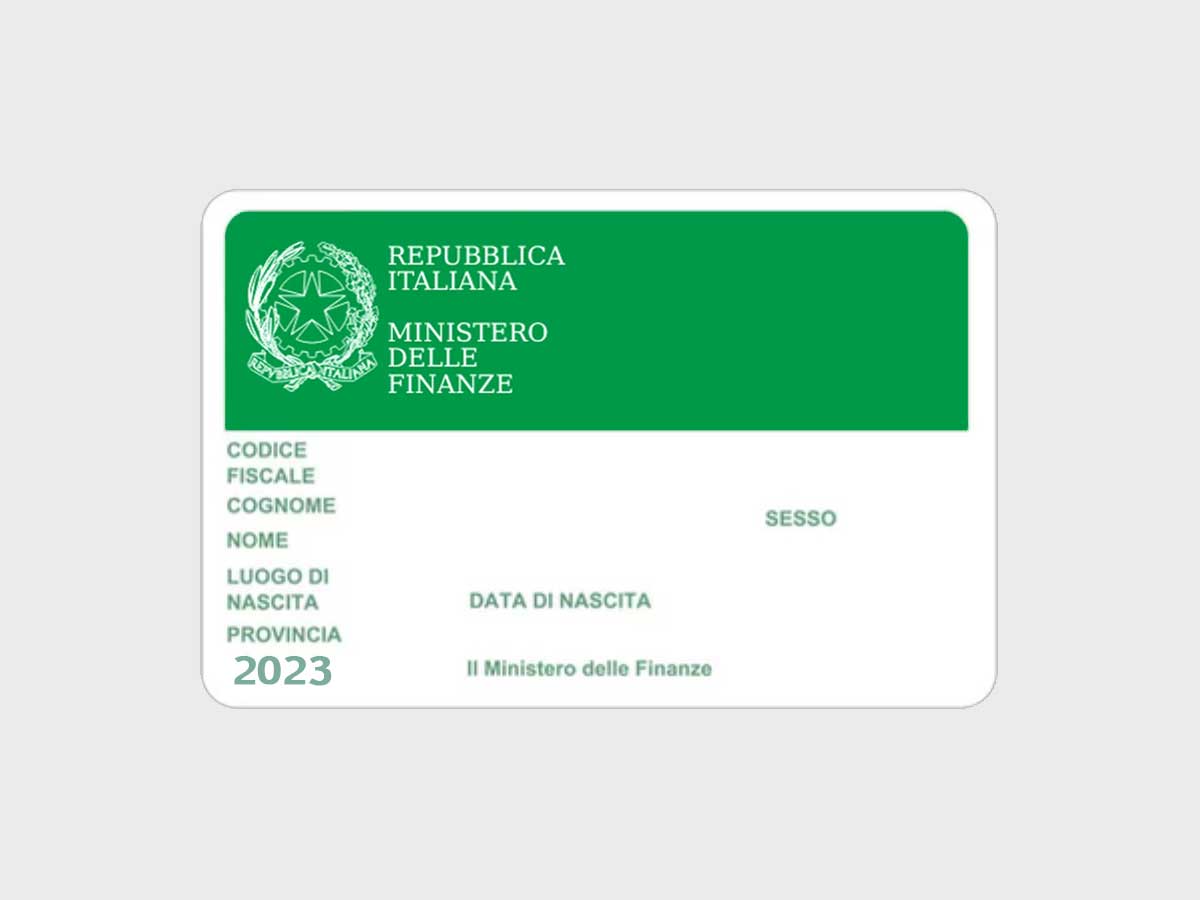What is Codice Fiscale?
Codice Fiscale is one of the first things you will need for life in Italy, but before getting into all that, let’s talk about what is it.
“Codice fiscale” is a unique identification code used in Italy for tax and administrative purposes. It is assigned to both individuals and entities, such as companies and organizations. The codice fiscale allows the authorities to identify and track individuals for financial and administrative purposes. It is required for a wide range of activities, such as opening a bank account, signing a contract, accessing healthcare services, and filing tax returns. Without the codice fiscale, individuals may face difficulties in engaging in these activities and may even be subject to penalties or limitations. Therefore, the codice fiscale plays a significant role in the daily lives of Italian citizens, ensuring efficient and accurate record-keeping for administrative and legal purposes.
History of Codice Fiscale
The codice fiscale, or tax code in Italy, was introduced in 1973 as a way to identify individuals for tax purposes. This unique alphanumeric code is assigned to Italian citizens and resident foreigners and is used in various administrative and legal procedures in Italy. The codice fiscale is based on the individual’s personal information, including their name, date and place of birth, and gender. Over the years, there have been several changes and evolution to adapt to new technological developments and regulations. In 1999, the codice fiscale was expanded to include businesses and organizations. In 2007, a new algorithm was implemented to improve the security and reliability of the code. Additionally, the introduction of online services in recent years has made it easier for individuals to obtain and update their tax code. Despite these changes, the main purpose of the codice fiscale remains the same – to provide a unique identification number for tax-related matters in Italy.
What makes up a Codice Fiscale?
The codice fiscale, or Italian tax code, is a unique identification number assigned to individuals and entities for tax and administrative purposes. It is composed of 16 alphanumeric characters, with each component representing specific information about the person. The first 6 characters consist of the person’s surname and name, or the entity’s name, with vowels removed and consonants compressed. The following two characters represent the person’s birth month or entity’s legal form. The next two characters indicate the place of birth or legal seat. The seventh character is determined by the person’s gender, with odd numbers assigned to males and even numbers to females. The 8th, 9th, and 10th characters represent the person’s birth year or entity’s year of incorporation. The 11th and 12th characters are check digits, calculated based on the previous characters to ensure accuracy. Finally, the last 4 characters are randomly generated and used for validation purposes. The codice fiscale is an essential element in Italy’s tax system, enabling efficient identification and management of taxpayers.
Why do you need a Codice Fiscale?
The codice fiscale, also known as the Italian fiscal code, is a unique identification number used in Italy for various bureaucratic, administrative, and legal processes. It is necessary in several situations, such as signing a lease for an apartment, opening a bank account for a real estate investment, purchasing a home, or entering into any legal contract. When signing a lease agreement, the landlord will require the codice fiscale to ensure proper identification and record-keeping. Similarly, banks will request this identification when an individual wants to open an Italian bank account, as it is crucial for verifying the person’s identity for financial transactions. Moreover, when making a home purchase, the codice fiscale is essential for legal purposes, including property registration and tax obligations. It is also necessary for entering into any legal contract, as it serves as a means of identifying the parties involved. Overall, obtaining a codice fiscale is a fundamental requirement for anyone living or operating in Italy.
Things you need a Codice Fiscale for:
- Employment: To legally work in Italy, employers require your Codice Fiscale for payroll purposes and tax deduction.
- Health Services: It is necessary to access the national health system and get health insurance. You will need your Codice Fiscale to register and receive medical assistance.
- Opening Bank Accounts: Italian banks require the Codice Fiscale to open bank accounts or perform financial transactions.
- Taxation: Your Codice Fiscale is essential for filing tax returns, paying taxes, and receiving tax benefits or refunds.
- Utilities: When setting up utilities such as electricity, gas, or water, you will be asked for your Codice Fiscale.
- Education: It is required for enrolling in schools, universities, or participating in educational programs.
- Renting a property: You will need Codice Fiscale to enter into legal contracts such as a lease, so it’s something you will need if you plan on staying in Italy longer than 30 days using holiday rental properties like AirBnb.
- Buying or Selling Property: The Codice Fiscale is necessary for real estate transactions, both for buyers and sellers.
- Government Services: To access various public services like obtaining identity cards, driver’s licenses, or passports, you will need your Codice Fiscale.
How to get a Codice Fiscale
Other than getting one from the consulate, obtaining a codice fiscale is an in-person procedure, and it’s not possible to do it online anymore. There have been instances of scams perpetrated by individuals outside the European Union who have requested CF, ID, and other documents with the intention of selling them and creating counterfeit documents, and … As a result, starting from April 2022, the “Agenzia delle Entrate” has made it mandatory to personally visit their offices to obtain the CF. The decision was also influenced by the absence of the Covid emergency.
EU Citizens
If you happen to be a citizen of the European Union (EU), then you are fortunate as it simplifies the procedure. Simply visit any office of the Italian Revenue Agency (Angenzia delle Entrate) in person and proceed to make a request, you should make an appointment before you go to minimize wait time.
It is essential to have a valid identification document or passport with you and Form AA4/8 filled out and signed. You can find the instruction for AA4/8 form here. Once done, you should be able to obtain your Codice Fiscale certificate on the very same day. In case you are located outside of Italy, you should be able to submit your request at either an Italian consular office or the Italian Embassy in your current EU country of residence.
Non-EU Citizens
Non-EU citizens can obtain the tax identification number by applying at:
• The Single desk for immigration (Sportelli Unici per l’immigrazione). The government institution manages the applications for a tax identification number for individuals seeking employment in the country or to be reunited with their family.
• Police headquarters (Questure). Foreign nationals who need a residence permit either issued or renewed are provided with tax identification numbers by the Police headquarters.
To apply, Non-EU citizens must have the following documents.
- a valid passport with (non-tourist) visa or residence permit (permesso di soggiorno)
- Entry stamp by Italy or any other EU or Schengen country , which cannot be more than three months old.
Apply for a tax identification number from abroad
Italian citizens are always eligible to obtain the Codice Fiscale. However, NON-Italian citizens can only receive it for specific reasons like paying taxes in Italy or completing specific administrative or legal procedures within the country. It cannot be obtained for unknown or future purposes. Additionally, the Italian Government mandates non-Italian citizens to clearly state the purpose for which they require a Codice Fiscale.
If you need a Codice Fiscale to apply for a study visa, include your acceptance letter from the school when applying for the Codice Fiscale. If you are not an Italian citizen and require a Codice Fiscale for renting or buying real estate in Italy, your request will need to be verified and confirmed by the Italian Consulate. Once you have chosen a property to rent or purchase, real estate agencies in Italy will require you to sign a pre-agreement or purchase agreement before transferring the funds to the seller and before signing the deed in the presence of an Italian notary. Please ensure to include a signed copy of this agreement along with the other necessary documents for the application (refer to the attached information and forms). Upon completion, we will issue the Codice Fiscale to you, which will be used for opening an Italian bank account and/or signing the property deed with the Italian notary.
Please be aware that the processing time usually exceeds a month when applying from abroad.
The best way to apply from abrorad
To expedite the process, you can authorize your Italian lawyer or property agent to obtain the Codice Fiscale on your behalf from a local Office of the Agenzia delle Entrate. You may need to provide them with a Power of Attorney (Delega) specifically for this task. However, obtaining a Codice Fiscale through an agent in Italy should be much quicker than requesting it through the Italian Consulate in the United States.
Privacy and Security Concerns
One of the risks associated with the disclosure of codice fiscale, which is the Italian tax identification number, is the potential for identity theft and fraud. If an individual’s codice fiscale falls into the wrong hands, it can be used to access personal and financial information, open bank accounts, or even commit crimes in their name. Another risk is the violation of privacy, as the disclosure of codice fiscale information can lead to unauthorized access to personal data, including sensitive medical records or employment information.
To ensure the protection of codice fiscale information, several measures can be taken. Firstly, individuals should be cautious and only provide their codice fiscale to trusted entities or individuals. It is also important to regularly monitor bank statements, credit reports, and any other financial activities to detect any suspicious activities. Additionally, The validity of a codice fiscale can be verified at the Agenzia Entrate site. Lastly, individuals or organizations should follow data protection and privacy best practices to prevent any accidental or intentional disclosure of the codice fiscale.
Over to you
In conclusion, the codice fiscale plays a crucial role in Italy and holds great relevance for both citizens and foreigners residing in the country for tax declaration, employment, healthcare, and accessing public services. The codice fiscale is essential for conducting any legal and administrative transactions in Italy, including opening a bank account, signing a rental agreement, or purchasing a property. For foreigners, obtaining and using the codice fiscale is equally important. It is required when applying for a residence permit, acquiring Italian citizenship, or starting a business in Italy. Additionally, the codice fiscale is often requested by employers for tax purposes and serves as a means to track an individual’s fiscal activities. It is thus crucial for foreigners to familiarize themselves with the codice fiscale and ensure they have it for a smooth and hassle-free experience in Italy.




